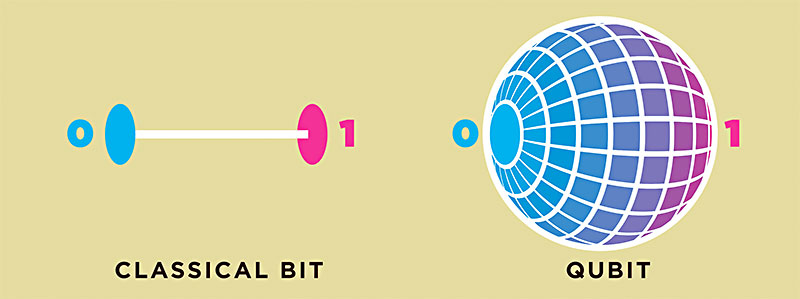Quantum Computer: The Next Big Leap
Quantum Computer
The Next Big Leap
Advancement in technologies is accelerating at a breakneck pace. We are encountering new technologies presently, which were mere imagination in the past. Similarly, the next giant leap that the entire scientific community is working on is to build a functional Quantum Computer that could offer amazing computing options. A couple of questions that arise in one's mind would be. "What is a Quantum computer? Why do we need Quantum computing despite having conventional classical computers, as well as supercomputers?" Let's address these questions here.
What is a Quantum Computer?
Both quantum and classical computers try to solve computational problems, but they manipulate data to get answers is fundamental different. To appreciate the uniqueness of quantum computers, one has to understand that superposition and the entanglement exits among the states of quantum systems, thses two principles of quantum physics are crucial for the operations of quantum computer.
Superposition is the counter-intuitive ability of a very tiny object at the quantum(atomic or subatomic) level.Consider an electron in an atom, which could simultaneously exit in multiple quantum state. One of the states could be the lowest energy level corresponding to the first nearest orbit to the nucleus, while the other may be the first excited level, i.e., the second nearest orbit to the nucleus. Suppose an electron is picpared (made to cxist) in a superposition of such two states, then there involves some probability of being in the lower state and some probability of being in the upper state, with total probabilities being 100%. However, superposition is fragile. With an external interaction like an observation (measurement) made about the system, the supcipositon gets destroyed, pushing the quantum system to become a conventional classical system with the same electron falling and existing in either the lower or upper state depending on the conditions.
In classical computing, information is stored as binary bits by making transistors either off or on, corresponding to the state 0 or 1. Understanding superposition makes it possible to understand the fundamental component of information in quantum computation, the Qubit (Quantum bit), which carries the information of two states at a time. When qubits realized with electrons, 0 and 1 simply correspond to states of lower and upper energy levels, as discussed above. In contrast to classical bits, which must always be in the 0 or 1 state, qubits with superposition state exist with varying probabilities that could be manipulated by undertaking quantum opcrations during computations.
Encanglement is a phenomenon among a collection of quantum systems, which could be created and/or manipulated such that non of them can be described without referencing to the others, where in the individual identities are lost. A measurement to find the state of one member of an entangled pair will immediately force the state of its partner to a correlated state, making it appear as though information can travel faster than the speed of light. It is experimentally proven that entanglement could exist even after the separation of entangled systems. This concept is exceedingly difficult to conceptualize when one considers how entanglement can persist over long distances. This apparent action at a distance was so counter-intuitive that even Einstein dubbed it "spooky effect at a distance."
Why Quantum Computing?
"Ihe primary motive for advancing towards building a quantum computer is its potential ability to execute Shor's algorithm for large numbers. To develop a broader view of quantum computers, it is essential to note that they would likely deliver tremendous speed-ups for specific types of problems. Researchers are working on finding out which problems are suited for quantum speed-ups and further developing algorithms to demonstrate such speed-ups. In general, it is believed that quantum computers will help immensely with problems related to optimization, which play vital roles in medicine, defense and financial trading.
Apart from computational speed-ups, other applications of quantum computers actively perccived by the rescarch community are listed below, which are beyond the scope of this overview:
- Quantum Sensing and Metrology, which leverage the extreme sensitivity of qubits to the environment to realize sensing beyond the classical shot-noise limit.
- Quantum Networks and Communications, which may lead to revolutionary ways of sharing information.
Opportunities in Quantum Computing
Since 2015, the interest in quantum computing across the globe has grown significantly: The worldwide investment has now gone up to 2,000 million Euros. The most considerable increase was seen in China, which not only encompasses quantum computing but includes quantum information systems as well.
India has provided funds of approximately 80 crores to achieve the technical capacity to build quantum computers and communication systems on par with the best in the world. India is realizing that Quantum computing provides an excellent research opportunity in and out of the country. ITTs, ISERs, IISes are providing research opportunities, and many faculty members in such institutes are working in the field of Quantum Computation. Various foreign institutes provide ample opportunity to perceive rescarch in this field.

Job opportunities in this field are not very distinctively defined. However, it is increasing as ISRO and DRDO are keen on making a Quantum Satellitc, having achieved a breakthrough in Quantum Communication. There have been many start-ups in Quantum Computing, such as Multiverse Computing, Riverlanc, and Q-CTRL. to name a few.
References
Quantum Computation and Quantum Information by Isaac Chung and Michael Nielsen

Classical and Ouantum Information Theory: An Introduction for the Telecom Scientist: by Desurvire F.
